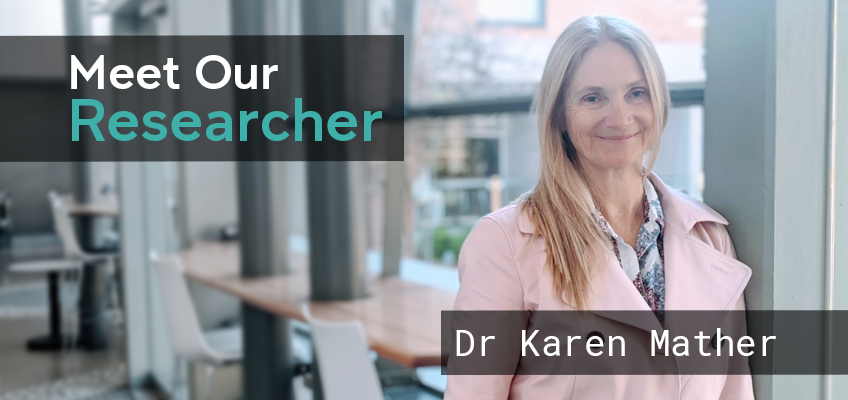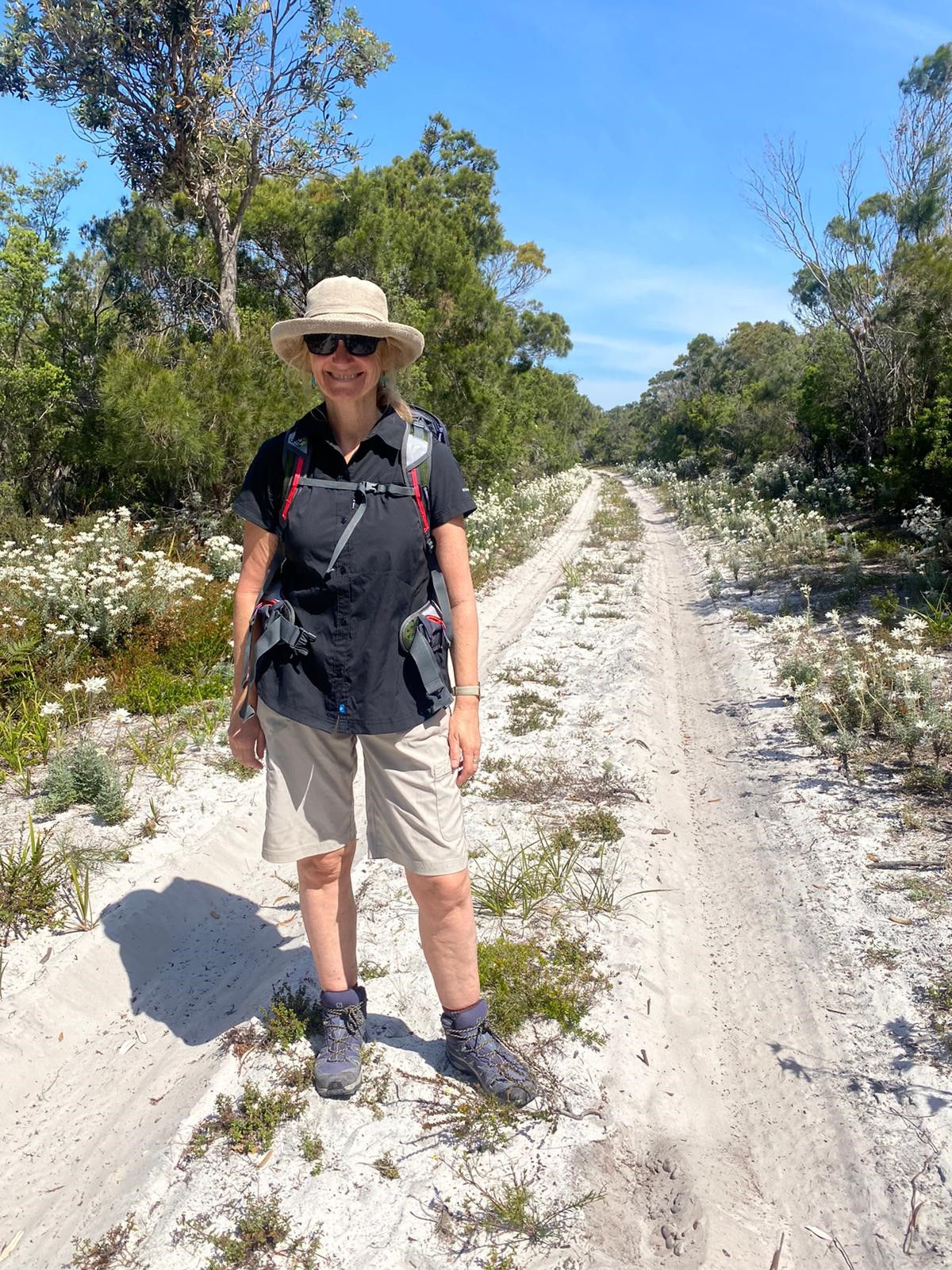13 Oct 2020

Dr Karen Mather’s multi-disciplinary research approach to understanding human ageing is dependent upon collaborating not only with CHeBA staff, but also national and international researchers and using publicly available data to provide a more comprehensive examination of the biological processes that underlie the rate at which we age. Dr Mather is enthusiastic about working with CHeBA’s unique studies - in particular the Sydney Centenarian Study - which is the only ongoing exceptional longevity study in Australia.
How did you get into researching the ageing brain?
Unlike most people I did not follow the traditional academic path but I have always had an interest in science. Prior to becoming a researcher I held other jobs including being a piano teacher and running a plant nursery. My first degree was completed at La Trobe University, Melbourne, which led me to a job with CSIRO as a Research Assistant investigating influenza. I then decided to travel around Australia and headed north from Melbourne. However, I did not get very far as I fell in love with a small historical village on the New South Wales coast; Central Tilba. Here I opened a little shop called ‘Along the Garden Path’ in the 1990s and started a family. A few years later, I completed, by distance education, a Graduate Diploma in Psychology and then received a scholarship to undertake my Honours degree in psychology at the Australian National University in Canberra, where I also completed my PhD. My doctorate was cross-disciplinary rather than pure psychology; I looked at whether telomere length is a biomarker of human ageing. Telomeres are found at the ends of chromosomes and protect them from degradation. However, each time a cell divides they become shorter. In general, as we age our telomeres continue to shorten, facilitating cellular ageing. An Australian, Elizabeth Blackburn - in conjunction with two colleagues - was awarded the Nobel Prize in Physiology in 2009 for her work on telomeres. I was introduced to her whilst I was at ANU doing my PhD. Since then I have been intrigued by human ageing, with a special interest in brain ageing, particularly when I have had family members affected by dementia. I met Perminder Sachdev, one of CHeBA’s Co-Directors in Canberra, as he collaborated on a population study I worked on: the PATH Through Life Study. He was also my mentor and over time offered me a position at CHeBA researching the genetics aspects of CHeBA’s studies. In 2009, I joined the CHeBA team.
Did you experience a ‘defining moment’ which led you to this field?
Whilst doing my PhD and researching telomeres and ageing, I became fascinated about the lack of knowledge regarding the contribution of genetics and other ‘omic’ factors - such as epigenomics and transcriptomics - to human healthy ageing and age-related decline and disease. In Australia, CHeBA is a unique academic research centre undertaking this type of research.

Do you have any personal interests or activities which are protective behaviours against cognitive decline?
Lately I have been doing lots of puzzles from the local newspaper and have discovered some new ones called KenKen and Binary Brain Snack. There is much evidence to suggest that learning new things is positive for brain health which is why I am also trying to learn the Mandolin, which was my great grandfather’s instrument. During the COVID-19 lockdown, I have not had to make my usual long commute to work via public transport, which generally took over 5 hours per day. This has allowed me to go to the beach for a walk every morning and go for a bike ride every night for an hour. I have been able to undertake new adventures, including riding around Lake Illawarra, which is about 40km. During my month-long service leave last year, I completed a 150km walk around the Greek Island of Corfu, which was my first long walk. This year I completed a 120 km hike along the Northern NSW coast. Physical activity is undeniably protective against cognitive decline. I am a pescatarian and again with less commute time I am getting the opportunity to try out new and healthy recipes, which support brain health. With regards to socialising, which is also considered beneficial for brain health, I am calling up people I have not talked to in a while and catching up with old friends. I am also enjoying video meetings with family and friends, especially with my relatives in Melbourne.
What are you currently researching?
A main research focus is examining the role of genetics in exceptional longevity using participants primarily from the Sydney Centenarian Study but also from the Sydney Memory and Ageing Study. We are exploring the genetic factors associated with living a long life, using individuals aged 95 and over as a model of healthy ageing. We are interested in questions like: What are the secrets of longevity? What makes some get illness later in life and others earlier? How can we translate those results into promoting healthy ageing?
Recently, we have begun to collect whole genome sequencing data on some of our participants, including centenarians, which is the most up-to-date method to assess the variation of our DNA code; with a current cost of approximately $1500 to sequence an entire person’s DNA sequence.
This data can be used to comprehensively assess the genetic profiles across participants from our CHeBA studies to pinpoint specific genetic variants that may lead to healthy ageing or on the other hand, increased risk of age-related decline and disease.
Another major focus is collaborating with researchers from around the world looking at the genetics of different age-related traits ranging from blood inflammatory markers to dementia. In this way we can pool our data with other national and international studies resulting in very large samples allowing statistically powerful studies. We are currently looking at the relationships between genetic variants linked to protein levels and longevity, using a sample of over 100,000 people, hoping to find new proteins and genetic variants linked to living to an exceptional age.
Why is your research important?
We really do not understand ageing from a molecular point of view and why each person ages at different rates. The research we are undertaking drills down to the basic molecular processes underlying ageing, trying to understand why we age and why at different rates. The hope is that we can use this information to better understand ageing pathways to then design methods to detect individuals who have a higher likelihood of experiencing age-related decline, including dementia. These are things we still cannot do with 100% certainty. The more information we have to identify and diagnose affected individuals, the better it will be for everyone.
We might be able to suggest different strategies to try and minimise risk and to develop treatments. That is the real hope for the future.
What do you love about working for CHeBA?
I love working in a multidisciplinary environment. When you are working with a wide variety of experts in their fields you can ask many different questions that intersect across different disciplines, such as examining the genetics of brain structure, cognitive performance and lipidomics. It is really exciting to undertake research that nobody else is doing in our unique study populations, which is a special thing about working at CHeBA. I am very passionate about making a difference in the world, with promoting healthy ageing being a major goal. I am also really interested in training the next generation of researchers and I really enjoy working with students. I may not be awarded the Nobel Prize in my lifetime, but you never know one of my students or their students might. That would be incredible.
What is the ultimate hope you have for your research?
To gain a better understanding of ageing from a molecular point of view because it is very difficult to find new diagnostics, preventative or treatment approaches if we do not understand how ageing, age related decline and disease happen. My ultimate aim is to translate my findings into the appropriate diagnostic, prognostic or treatment strategies and to inform others of how to live a healthy life.
This interview was undertaken during the COVID-19 self-isolation period. Dr Karen Mather found that having video and phone calls with her family and friends enabled her to feel socially connected while remaining physically isolated. Taking up bike riding in the late afternoons has also allowed Dr Mather to keep physically active.
Donations are fundamental for critical research to continue following COVID-19.
If you would like to discuss supporting Dr Mather's work specifically, or would like information
on leaving a legacy via a Gift in your Will, please contact h.douglass@unsw.edu.au.

Dr Karen Mather is a Senior Research Fellow and the Leader of CHeBA’s Genetics and Epigenomics Group, which aims to provide insights into the biological processes underlying ageing, age-related decline, and disease from a genetics and epigenomics perspective. Dr Mather attained Honours degrees in both Biochemistry and Psychology and completed her PhD in Psychology at the Australian National University in 2009.
Dr Mather has broad research interests in the field of human ageing research. Her primary aim is to identify and understand the roles genetic and epigenetic factors play in ageing and age-related disease. Dr Mather is particularly passionate about longevity research, with the ultimate aim of translating her research into not merely living longer but experiencing a higher quality of life throughout the lifespan.
